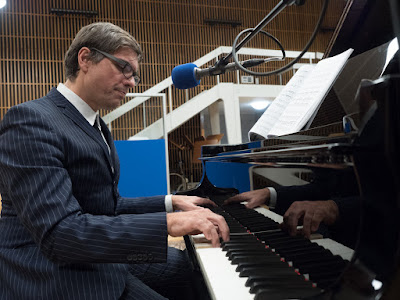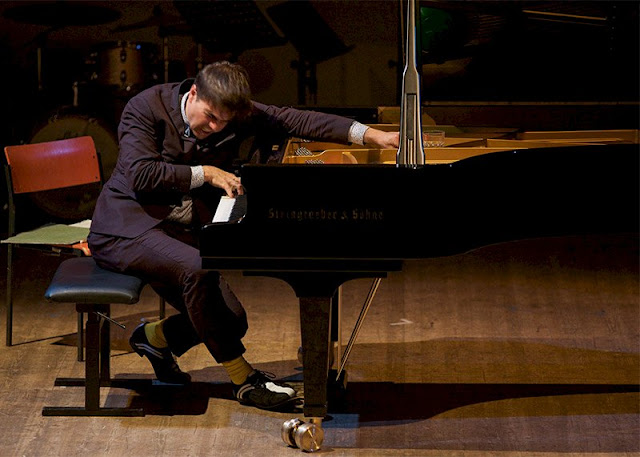 |
| Moritz Eggert (Photo Christian Hartlmeier Klein) |
 |
| Moritz Eggert and Wilhelm Killmayer |
Moritz was very influenced by Wilhelm Killmayer (1927-2017) who was Moritz's teacher at the Hochschule für Musik und Theater München. For Moritz, Killmayer was one of the most free-thinking of German composers of the time; during the 1980s, Moritz describes German composers as being frequently dogmatic, either belonging to this movement or that. Killmayer stood apart from this and encouraged his students to be as free as possible. And it wasn't just a mode of thinking for Killmayer's students, Moritz finds Killmayer's own music very free.
 |
| Moritz Eggert (Photo Katharina Dubno) |
He is critical of composing techniques which insist that something has to be here, because of the plan. And Moritz's response is why? He thinks that there is more interest for the listener if a composer doesn't follow their plan.
Listeners are an entity which Moritz takes seriously when composing, and he tries to get into their head. Of course, this is not entirely possible but you can look and listen, asking questions, 'is this necessary?', 'is this too long'. So as Moritz composes he is constantly questioning in is head. And he feels this questioning is more important than any technical decisions, he doesn't stick to the plan if it doesn't work.
Composition for Moritz is always about telling a story. He has a very clear idea of what a piece is about and he creates a linear development which takes the listener on a journey so that the end is different to the start, and you reconsider things that you have heard before.
Regarding his influences, he listens to a lot of contemporary music and cites Wolfgang Rihm, Helmut Lachnemann, Iannis Xenakis, John Cage, and Morton Feldman. But the composer who inspired him to become a composer was Eric Statie, a composer who was isolated yet extremely influential and whose combination of stubbornness and uniqueness Moritz finds akin to elements of Wilhelm Killmayer's life. Another composer he quotes is Charles Ives, partly for Ives exuberance and positive approach to dissonance, which Moritz finds very different from the Second Viennese School. For the Viennese, dissonance was used to depict extremes and madness, with works like Lulu and Erwartung using dissonance to depict the borders of sanity. Ives, on the other hand, viewed dissonance and note clusters as a positive thing, the more notes the more energy!
 |
| Moritz Eggert |
He applies this to the younger generation and tells his students to continue to be performers too, you learn more about your pieces by playing them, whether they are boring or not! And Moritz sees us, in a way, returning to the idea of the composer/performer from the past. He also encourages his students to listen to what you are, he feels you can only write what you love. If you put on a mask to impress people then they are not listening to your inner voice. Moritz admits that it is a hard process to find your inner voice. You need to trust yourself, and as a student, you usually don't. As a teacher, he seeks out students talent and supports them, whilst challenging them in areas where they are not so strong.
Whilst not a prodigy, Moritz grew up in an artistic environment full of music, arts, film and literature. At the age of 14 or 15 music took over and became the most important thing in his life, his first serious compositions date from this period. But it was a big change in his life, he had a lot of catching up to do. Whilst he had had a good piano education, he was well behind his contemporaries who have specialised when younger.
Moritz's current major project is his opera based on Fritz Lang's film M. This premieres at the Komische Oper, Berlin on 5 May 2019. About a child murder, Moritz calls it a very Berlin story. He has three more operas in the pipeline, plus a violin concerto and a piano concerto.
 |
| Moritz Eggert (Photo Astrid Karger) |
That said, every new piece needs its crisis, the beginning is easy but you become unsure of everything at some point
Moritz Eggert on Disc:
- Moritz Eggert - Muzak, Number Nine VII: Masse - available from Amazon
- Moritz Eggert - Wide Unclast - available from Amazon
- Moritz Eggert - I Belong This Road I Know - available from Amazon.
Elsewhere on this blog:
- Alan Rawsthorne - a portrait: Chamber music and woodwind concertos (★★★) - CD review
- Unashamedly Romantic: Reynaldo Hahn chamber music from James Baillieu and friends (★★★★½) - CD review
- Transcendent mysticism: Vaughan Williams' Mass from St John's College (★★★★★) - CD review
- Te Deum: Purcell & Charpentier at Westminster Abbey for London Festival of Baroque Music (★★★★) - Concert review
- All-star Orfeo - Iestyn Davies and Sophie Bevan at the London Festival of Baroque Music (★★★★) - Concert review
- Sonorous debut: Neil Ferris & Sonoro in Frank Martin & James MacMillan (★★★★) - CD review
- Gilbert & Cellier: A work of real musical personality, The Mountebanks rediscovered (★★★★) - CD review
- Vivica Genaux & Sonia Prina recreate the music sung by two great castratos at the Wigmore Hall (★★★★) - concert review
- The story of a journey: Roderick Williams & Christopher Glynn in Schubert's Winter Journey (★★★★★) - CD review
- Welcome to the Magical Garden or perhaps the Garden of Magic: the piano music of Robert Saxton (★★★★) - CD review
- Philip Venables' 4:48 Psychosis returns (★★★★) - Opera review
- Thrilling revival: Shostakovich's Lady Macbeth of Mtsensk at Covent Garden (★★★★★) - Opera review
- Striking double in Clapham: Shadwell Opera debuts a new work with powerful Janacek song-cycle (★★★½) - opera review
- Music from Handel's London Theatre Orchestra (★★★★) - CD review
- Passio: from Tallis & Purcell to Kevin Hartnett via Bach (★★★) - CD review
- Home





%20TallWall%20Media_Oxford%20Song.jpg)
%20TallWall%20Media_Oxford%20Song.jpg)
%20TallWall%20Media_Oxford%20Song.jpg)



No comments:
Post a Comment